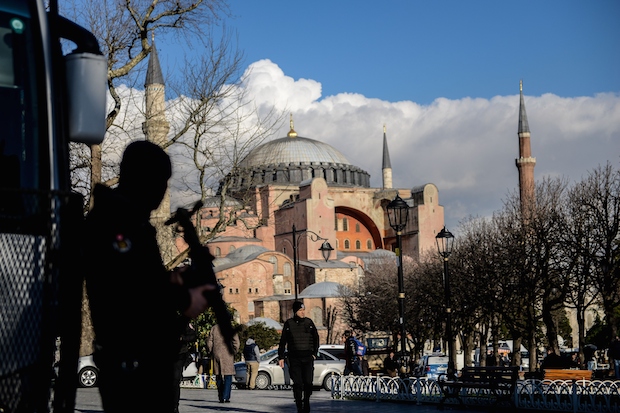On Tuesday, Isis’s strategy in Turkey changed. Nabil Fadli, a 28-year-old Saudi national linked to Isis, blew himself up in the heart of Sultanahmet, a tourist district of Istanbul. 11 tourists were killed, including ten Germans.
In some ways, it was familiar: this was Isis’s fourth successful attack on Turkish soil since June. Previous bombs, however, had targeted pro-Kurdish and leftist groups: one, last July, targeted Suruç in the Kurdish south-east; in October, another took over 100 lives in at a peace rally in Ankara.
The perpetrators of both these attacks were traced back to an Isis cell in the Turkish city of Adıyaman, and the government was criticised for failing to respond to repeated local pleas for intervention earlier in the year. As Isis planned, discord was sown between the Turkish state and its Kurdish citizens: by the end of the year, a two-and-a-half-year peace process with the PKK had fallen apart.
The Sultanahmet bomb was different. The casualties were tourists, not Kurds: this was an attack on Turkey’s economic interests first and foremost. With the amount of Russian tourists already in decline after the downing of a Russian military jet in November, many fear that this latest tragedy will have a similar effect on German holiday-makers, who contribute more to the tourism industry than any other group.
The mood was bleak in Sultanahmet, as the call to prayer echoed through the deserted streets. ‘It’s a disaster,’ says Ahmet, who runs a gift shop opposite the site of the explosion. ‘This will give the impression that Istanbul is no longer safe for tourists.’
Others were more upbeat. ‘Tourism won’t suffer in the long-term,’ says Murat, who runs a tour agency in the heart of Sultanahmet. ‘Isis bombs are happening all over Europe, all the time. In a couple of months, people will have completely forgotten about this bomb.’
Murat’s reaction reflects a defiant indifference that could be felt across Istanbul, despite the apparent ease with which Isis militants have been able to carry out operations in Turkey. Turkish citizens, it seems, are increasingly less terrified by terror: internal and external threats look unlikely to recede, but President Erdoğan’s recent victory at the polls suggests that Turks are happy to put their faith in such an authoritarian strongman.
After the bomb, Erdoğan asked: ‘Is there any other country that struggles against Isis in a more determined way than we do? The primary target of all terrorist organizations in this region is Turkey because Turkey is struggling against all of them with the same resolution.’
Despite Ankara’s manifest failure to protect civilians from the rising threat of Isis, Erdoğan was able once again to draw upon nationalism as a means to deflect blame. Many shopkeepers in Sultanahmet were enraged by the slightest suggestion that some responsibility for the atrocity could be attributed to the government’s benign neglect in tackling Isis, something the Kurds were quick to assert after the bombs in Suruç and Ankara.
This is not new. When I met Kurdish human rights lawyer Tahir Elci a few weeks before he was killed in Diyarbakır, he lamented that for the vast majority of Turks, defence of their country’s honour trumps any desire for progress, or justice. As a result, Turkey will continue to be defiant in face of terrorist atrocities, without actually tackling the causes of such attacks.
Indeed, nationalist sentiment has been on the rise ever since Ankara resumed operations against the PKK in the south-east, and it appears that Turkish faith in their başkan (leader) will not waver anytime soon. Isis may have changed their strategy; the Turkish people seem unlikely to change theirs.






Comments